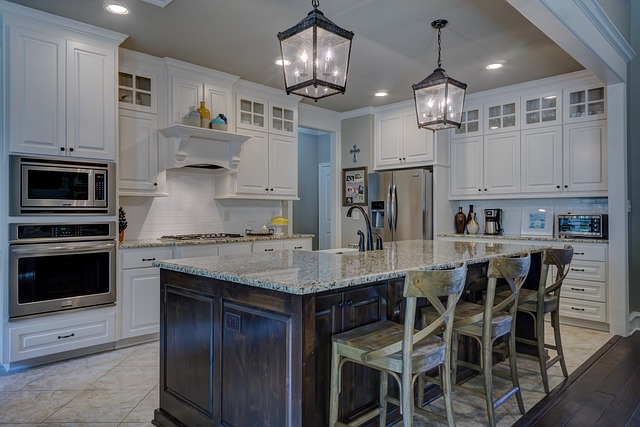exploring the financial landscape for home improvement projects, this article illuminates the diverse contractor financing options available. Whether you’re a seasoned contractor or new to the field, understanding your financial needs and securing favorable funding is paramount. We delve into traditional and alternative loans tailored for your trade, providing actionable tips to enhance your creditworthiness. Join us as we navigate the complexities of contractor financing, ensuring you’re well-equipped to fund your next project with confidence.
- Understanding Contractor Financing Options: A Comprehensive Guide
- Assessing Your Financial Needs: What Type of Financing Suits Your Home Improvement Project?
- Navigating Traditional and Alternative Loans for Home Improvement Contractors
- Maximizing Your Creditworthiness: Tips to Secure Favorable Financing as a Home Improvement Contractor
Understanding Contractor Financing Options: A Comprehensive Guide

Navigating the landscape of home improvement financing for contractors can be a complex task, requiring a keen understanding of various financial instruments and strategies. Contractors have multiple financing options at their disposal, each with its own set of advantages and considerations. Traditional bank loans, lines of credit, and equipment financing are common avenues, offering predictable repayment schedules suitable for long-term projects. Alternatively, accounts receivable financing can provide quick access to funds by leveraging the value of outstanding invoices. Additionally, hard money loans serve as a short-term solution when rapid capital is needed for urgent projects. It’s crucial for contractors to assess their specific financial needs and project timelines to determine which financing option aligns with their business model and cash flow requirements. Understanding the nuances of each option—from interest rates to repayment terms—is essential for making informed decisions that can lead to the successful completion of home improvement projects. Contractors should also stay abreast of government-backed programs, which may offer favorable terms or guarantees to facilitate business expansion and project diversity. By thoroughly evaluating all available contractor financing options, professionals can ensure their operations remain fluid and financially sound, enabling them to capitalize on opportunities in the dynamic home improvement sector.
Assessing Your Financial Needs: What Type of Financing Suits Your Home Improvement Project?

When contemplating home improvement projects, contractors often face the critical task of securing adequate financing to cover costs. Assessing your financial needs is paramount to determine the most suitable funding option for your endeavor. The scale and scope of each project will influence the type of financing required—whether it’s a small renovation or a full-scale construction. For instance, short-term projects may benefit from lines of credit or short-term loans that offer quick access to funds with the flexibility to repay upon project completion. On the other hand, long-term projects might necessitate more structured financing solutions like equipment financing, business loans, or even partnerships with investors. Each option comes with its own set of terms and conditions, including interest rates, repayment schedules, and covenants that can impact cash flow and overall financial health. Contractors must carefully evaluate their immediate and future needs to select a financing path that aligns with their project’s timeline, budget constraints, and revenue potential. By doing so, they can ensure that the chosen financing route not only supports the current home improvement project but also positions them for sustained growth and success in the competitive contractor financing landscape.
Navigating Traditional and Alternative Loans for Home Improvement Contractors

Contractors often find themselves in need of reliable financing solutions to fund home improvement projects effectively. Traditional loan options, such as bank loans or credit lines, have long been a staple for contractors seeking financial support. These conventional loans typically require a solid credit history and may involve a lengthy application process. However, the landscape of contractor financing has evolved with the emergence of alternative funding sources that cater to varying financial situations and project requirements. Alternative financing options like hard money loans, equipment financing, or invoice factoring offer flexibility and speed, often providing the necessary capital within a shorter timeframe than traditional bank loans. These alternatives can be particularly beneficial for contractors who may not meet the stringent criteria of conventional lenders or require immediate funding to seize project opportunities. It’s crucial for contractors to weigh the pros and cons of both traditional and alternative financing options, considering factors such as interest rates, repayment terms, and the specific needs of their home improvement projects. By exploring a range of financing solutions, contractors can make informed decisions that align with their business goals and project demands.
Maximizing Your Creditworthiness: Tips to Secure Favorable Financing as a Home Improvement Contractor

When seeking favorable financing for home improvement projects, contractors must prioritize maximizing their creditworthiness. A robust credit score is a cornerstone of securing competitive rates and terms on loans and lines of credit, which are essential for managing cash flow and funding materials and labor. To enhance your credit profile, consistently make payments on personal and business debts in a timely manner. Late or missed payments can significantly harm your credit score, leading to less favorable financing options. Additionally, regularly reviewing your credit reports from major credit bureaus can help identify and correct any inaccuracies that may be affecting your score.
Moreover, it’s pivotal for contractors to maintain a healthy business financial structure. This includes keeping accurate and up-to-date financial records. Lenders will scrutinize your income statements, balance sheets, and cash flow projections to assess your financial stability and reliability as a borrower. Demonstrating consistent revenue, controlling expenses effectively, and having a clear plan for project profitability can all contribute positively to your financing application. By showcasing solid financial management and a strong credit history, you’ll be in a stronger position to secure contractor financing with favorable terms, enabling you to take on larger projects and grow your business.
Contractors looking to expand their home improvement endeavors will find a wealth of financing options at their disposal. By carefully assessing financial requirements and enhancing creditworthiness, contractors can navigate both traditional and alternative loan avenues effectively. This guide has illuminated the path to securing favorable financing, ensuring that your business can take on new projects with confidence. With the right approach and understanding of contractor financing, you’re well-equipped to grow your operations and meet the demands of the dynamic home improvement market.
